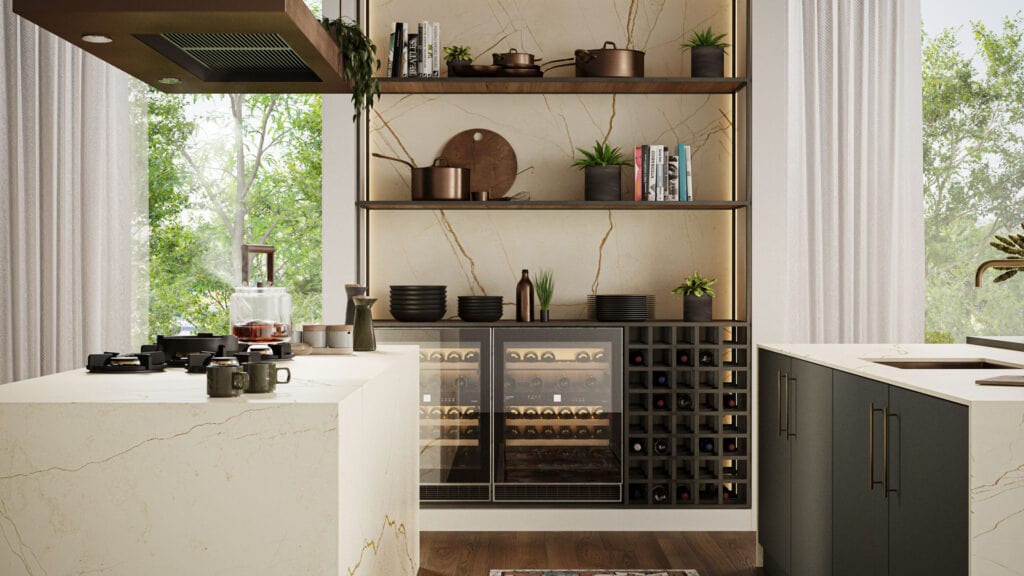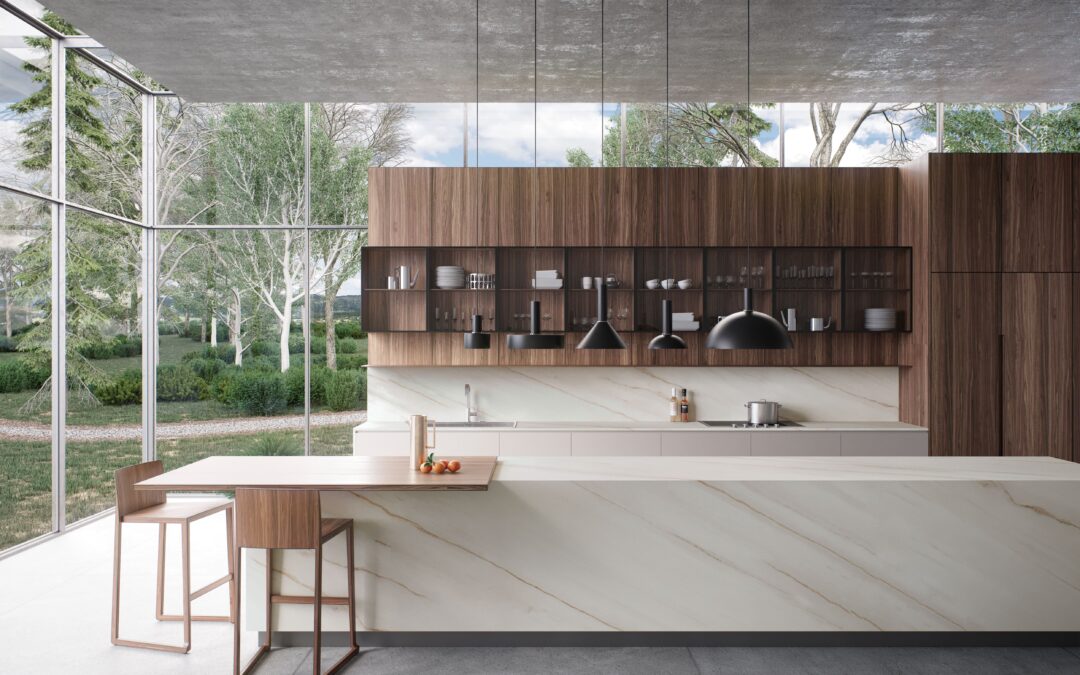From its strength and durability to its striking stone-like appearance, a porcelain worktop comes with many desirable benefits. But if you’re new to porcelain counters, you might be curious to know how they fare when compared with classic worktop materials like engineered quartz and granite.
Is porcelain a good worktop material for wet rooms and bathrooms? Will it hold up under the heat of the kitchen? We’ll be sharing all the facts you need to know, so you can make an informed choice before committing to purchase.
How is a Porcelain Kitchen Worktop Made?
Unlike granite and marble worktops, which are made from natural stone, porcelain worktops are a kind of ceramic, much like the type you’d find in quality ceramic bowls or high-end decorative tiles.
These porcelain-based ceramic kitchen worktops are normally made by combining refined raw materials like kaolin, feldspar, and silica (found in quartz) with other additives. This mixture is then transformed into neat slabs using pressing or casting techniques.
Once the slabs have been formed, the porcelain is then moved into industrial kilns that often reach temperatures between 1200 °C and 1400 °C. This firing process, known as sintering, transforms the raw mixture into a dense, water-resistant surface that is both non-porous and extremely durable.
After firing, the worktops are cut, polished, and even printed onto to replicate the look of natural stone.
All of these processes combined help to create a stylish, long-lasting ceramic worktop that’s ideal for use in kitchens and bathrooms.
Porcelain vs Granite
When it comes to porcelain vs granite, there are some useful differences to know about. Here are some facts which may be helpful when picking a worktop for your home:
Heat Resistance: Heat-wise, both porcelain and granite fare remarkably well when exposed to high temperatures. However, since porcelain is fired at such extreme temperatures and goes through a process of vitrification (which transforms it into a glass-like state), it can withstand even more heat than granite can. Granite tends to stay unscathed up to around 250 °C, whereas porcelain stays intact even at temperatures reaching 1200 °C. Of course, this is usually dependent on the make and the exact material composition.
If you’re opting for a granite surface, it’s important to be aware that while its heat resistance is generally excellent, you should avoid exposing it to sudden extreme temperature changes (i.e. going from freezing cold to boiling hot too quickly). While rare, if this happens, it can cause something called thermal shock, which occasionally leads to cracks and discolouration.

Porosity: When it comes to porosity, there is a noticeable difference between granite and porcelain. Granite is a naturally porous stone, which means it requires regular sealing to protect it from bacterial penetration and staining. Porcelain, on the other hand, is extremely non-porous, so it doesn’t need to be sealed and is highly resistant to stains.
Aesthetic: For those drawn to granite, the aesthetic is often a big part of the appeal. Since granite is a natural stone, granite worktops come in an array of interesting patterns and colours, with no two slabs the same. Although this look can be effectively replicated on porcelain thanks to modern printing techniques, some customers want an original piece that can’t be found anywhere else.
Happy to have your porcelain printed? There are tonnes of colours, patterns, and stone effects to choose from, so you’ll have plenty of different options to suit your home.
Durability: If you’re after something tough and hard-wearing, both porcelain and granite are great options. Both of these worktop materials can last a long time if cared for; however, porcelain has a slight edge over granite, given that it’s so dense and can completely resist chipping and cracking. With both worktop material options, it’s not recommended to chop directly onto them. With granite, chopping can cause scratching over time, and with porcelain, it can result in blunt knives.
Porcelain vs Quartz
Choosing between porcelain and quartz instead? Here’s what you need to know:
Heat Resistance: Both porcelain and quartz worktops are highly resilient when it comes to heat, but again, porcelain pulls ahead. Quartz, while incredibly tough, can normally handle hot pans and daily kitchen heat up to around 150 °C–200 °C, vs porcelain’s heat resistance up to 1200 °C. It’s also useful to note that quartz contains resin binders, which can be damaged by sudden or prolonged high heat exposure, so it’s best to avoid putting hot pots straight onto a quartz surface.
Porosity: When it comes to porosity, porcelain and quartz are pretty much on par. Quartz worktops are made from natural quartz crystals mixed with resin, making them resistant to both water and stains without the need for sealing.
Although due to its vitrified surface, porcelain is slightly less likely to absorb liquids overall, both materials are very hygienic, making them solid options for kitchens and bathrooms.
Aesthetic: Design-wise, both quartz and porcelain offer plenty of flexibility. Once known for their uniform, predictable look, quartz worktops now feature delicate, sparkled flecks that mimic natural stone, intricate marble-esque veining, and even a range of different colours. Porcelain pushes this variety a bit further, introducing wood styles, oxidised metal effects, and more.
Durability: Finally, in terms of durability, both porcelain and quartz are ultra-hard-wearing, but their toughness shows different strengths. Quartz is slightly softer than porcelain, and due to its resin content, can be slightly more vulnerable to heat damage and scratches over time. Neither surface is recommended for chopping directly on, as both can dull your kitchen knives.
How Should I Care for My New Porcelain Worktop?
One of the best things about a porcelain counter is that maintenance is a total breeze. With a squeeze of washing-up liquid and some warm water from the sink, you can simply wipe down your worktop and dry it off with a paper towel.
As we mentioned earlier, the non-porous nature of porcelain makes it ideal for keeping clean, and its natural resistance to most household chemicals means you don’t need to worry about everyday spills or cleaning products damaging the surface.
That said, it’s best to avoid abrasive cleaners or harsh chemicals like concentrated bleach or strong acids, as these can dull or damage the finish over time.
Explore Porcelain Kitchen and Bathroom Worktops in Bristol
At our Marble Supreme Showroom in Kingswood, we offer porcelain Caesarstone worktops and Neolith kitchen worktops in a number of different modern designs. If you’d like to chat to us about styles to suit your home, pop in and say hello. Or, get in touch with our friendly team, and we’d be happy to help you out over the phone.
